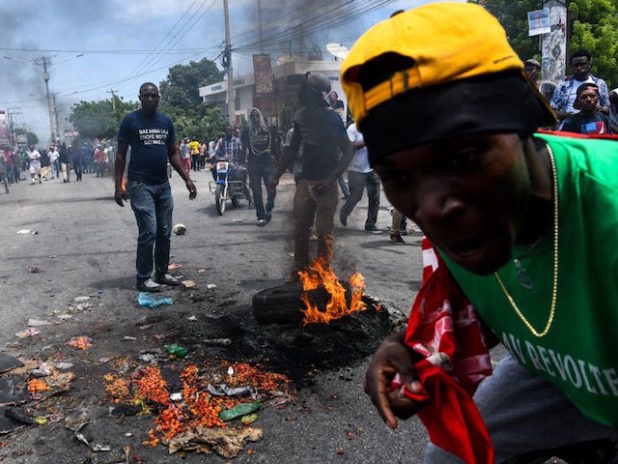Pomidor Quixote
Daily Stormer
June 20, 2019
Haitians in Haiti
Look at the bright side: the border crisis is enriching America with diversity from all around the world.
Border Patrol agents are tackling a new influx of migrants from Haiti coming across the U.S. border, an unexpected change from the anticipated flow from Central America that has strained the U.S. immigration system.
Over the past week, more than 180 Haitians have been arrested by Border Patrol agents at the Del Rio Station in Texas, a figure greater than the number of Haitians apprehended over the past three years nationwide, a Department of Homeland Security official told Fox News Wednesday.
We’ve already received blacks from Africa, blacks from Haiti, Indians, Aztecs, Mayans, and other jungle legume creatures.
This will only get worse unless something changes. The world is seeing how everyone is getting in and they’re not hesitating to follow.
Trump said he will deport millions, but without an effective physical barrier, the invaders are likely to continue taking their chances.
Following a deadly earthquake in Haiti in 2010 and subsequent political turmoil, the U.S. saw a surge in immigrants from the poorest country in the Western Hemisphere, with 786 apprehensions nationwide in 2013, according to data provided by the Department of Homeland Security. That number climbed to 1,044 in 2014 but shrank dramatically in 2015 to 379. Since then, the U.S. has averaged about 165 apprehensions from Haiti for the past three years — until now.
The poorest county in the Western Hemisphere is also the first independent black country and likely the blackest country (percentage of the population) outside of Africa.
More Haitians in Haiti
What a coincidence.
On Wednesday, the Senate Appropriations Committee approved President Trump’s $4.6 billion request for supplemental funding to tackle the escalating humanitarian crisis at the southern border.
In all, $3.3 billion of the relief package would be used for necessities such as food, medical care and shelter for unaccompanied children and families coming across the border. The majority of that funding, $2.9 billion, would be for Department of Health and Human Services’ Office of Refugee Resettlement to deal with detained children who have yet to be placed into custody with a family member or sponsor in the U.S, while the remaining funds would allow DHS to set up and tend to immigrants in temporary processing facilities crossing the border as a family unit.
There are so many struggling American families that could benefit enormously from that kind of aid, but we can’t help them because foreigners are always the priority. You know, human rights.
Do you want to know when this will end? Bloomberg has the answer in a piece titled “Southern Border Crisis Will End When Central America Prospers.”
In the short term, solutions to the crisis mostly involve throwing more resources at the system. Detention conditions can and should be made much cleaner, safer and more comfortable. The capacity of the asylum system should be increased and streamlined, so that applications are processed in months instead of years. And the government can track asylum applicants to make sure that they show up for court after being released. Meanwhile, the U.S. can cooperate with Mexico to reduce the flow of Central Americans coming north — though this cooperation would probably require President Donald Trump to abandon his aggressive, bullying approach.
Why would you want to reduce the flow of Central Americans coming north if they’re legitimate asylum seekers?
This has to be addressed. If these are legitimate claims, why get in their way? If these are not legitimate claims, why even process them now?
If they’re legitimate but we can’t take that many of them, then why not just build a wall?
In the long term, the key is to change the conditions that lead so many Central Americans to leave their countries and make the long trek north.
…
Guatemala and El Salvador are right around the point where migration pressure tends to peak — in other words, as these countries get richer, fewer people will want to leave. This means that boosting the economies of these countries should reduce the flows of migrants. (Honduras is a little trickier, since it’s still poorer than the peak migration level, so it will probably take longer before prosperity helps to reduce the outflow.)
To boost the economies of the Northern Triangle countries, the key is investment and trade. The U.S. should immediately give major tax credits for any U.S. company that invests in Guatemala, El Salvador or Honduras. It should also eliminate tariffs on products from these countries. Additionally, the U.S. should work with the governments of Northern Triangle countries to improve infrastructure and education, and establish supply chains from those countries to the U.S.
There you have it. The geniuses at Bloomberg want Americans to help invaders so they don’t invade.
It’s not blackmailing and it’s not extortion. It’s human rights.
It’s who we are.
It’s the right thing to do.
Actually, the right thing to do is to build a huge wall, cut all contact with these creatures, and let them deal with their problems on their own.
We have our own battles.
Associating with browns has no upside. “But they won’t invade you if you give them money tho” is not an upside.
We’re not going to let them take our country hostage.
We don’t negotiate with legumes.




